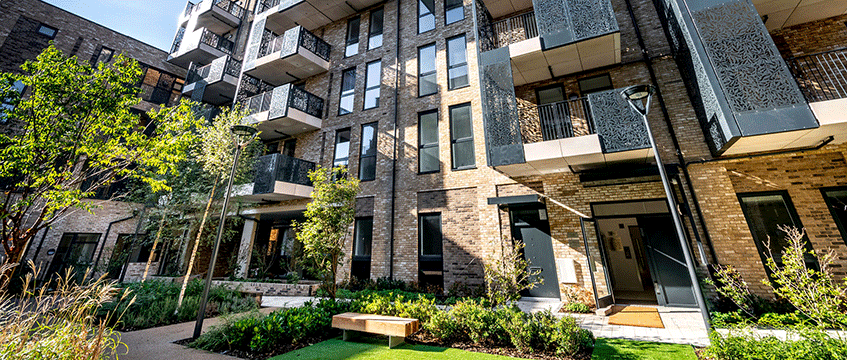It was around Christmas time that Brendan Sarsfield first started thinking about hand sanitiser and face masks. His daughter was living in Beijing and he was closely following the news of a virus outbreak in China.
Until then, the chief executive of Peabody had never heard the term “PPE”. But in the months since, it has become essential for the London housing association, which has 67,000 homes, more than 133,000 residents and 3,000 staff.
“We have care homes and supported housing, and we desperately needed PPE. The hospitals couldn’t get it, registered care homes couldn’t get it, we were all fighting and looking for it. We were having deliveries cancelled and diverted to hospitals,” says Sarsfield, speaking from his home in Barnet, north London, where he has been in lockdown with his wife, two daughters and two dogs.
Then people started working together. Housing associations and businesses began sharing equipment and collaborating in the coronavirus crisis. Peabody saw its number of volunteers double, with 1,000 people putting their hand up to see how they could help. And its commercial tenant, the Mercato Metropolitano food market, began delivering food parcels from Peabody’s Newington Triangle site in Southwark, SE1.
Sarsfield says this community response and the need for local contact has forced him to rethink the business entirely: “The bigger picture is that we probably want to be something different longer-term following this.”
For now, he is unsure what that will look like. But he says it will involve a slowdown in development, a reduction in risk and a greater emphasis on social purpose. “We want to build on that speed that we’ve been able to move at, the confidence we’ve gained from doing that successfully, and to try to keep that momentum going.”
Crisis planning
Coronavirus was not Peabody’s introduction to emergency planning, and the business’s existing stress tests have been called on during the current crisis.
“Some of those elements, for example in planning for a collapse in the property market, have helped us here,” Sarsfield says.
Housing associations have been exposed to market forces through the shift to the cross-subsidy model, under which profits from private sales are used to finance affordable housing, in place of grant funding. Many have struggled with a slowdown in sales and rising build costs, and Peabody sought to boost liquidity to protect itself.
The housing association was still performing well before the pandemic hit. In the six months ending September 2019, it reported a surplus of £59.2m (up by 10.5% on the previous period), rising to £67.2m once the recently acquired Town & Country Housing is included. The association had also increased its available funding lines by more than £600m – with £1.2bn now on hand.
“A lot of those things have helped us here, but we never foresaw anything like this,” says Sarsfield. “There are still huge challenges ahead, which perhaps will be second and third waves of the virus, and the economic consequences of it all.”
More recently, income and expenditure are down, and so is Peabody’s appetite for risk.
Following a two-year development drive, strengthened by a £6bn merger with Sarsfield’s Family Mosaic, its strategic partnership with the Greater London Authority and its mammoth 20,000-home Thamesmead Waterfront regeneration, the company is putting on the brakes. Peabody has dropped its new-build target for next year from 3,300 homes to 2,000 and will focus on supporting tenants and changing the company.

“We house very vulnerable people,” says Sarsfield. “A lot of poor people and people who have been worst affected by Covid-19. We have had 19 deaths, that we know of, so far in our tenancies.
“It is an economic challenge going forward. Many of our residents are going to be made redundant. We’ve got to help them through that transition. We’ve got to see where the housing market goes, that’s an unknown. We’ve got to see where London goes, that’s an unknown.”
‘Be aspirational’
Sarsfield says he will be spending the coming months speaking to customers, partners and staff to understand what the business should now look like.
“My feeling is that it is going to be around how we get more local to our customers, more part of the community, rather than sitting outside of it.”
In their evolution, housing associations have merged with and absorbed one another. That consolidation has created enormous entities – and Peabody is one of the largest.
“There are advantages in being big. We may be very efficient, but we’ve got to have a very human and kind front-end service, and that’s what we’ve got to work hard at,” says Sarsfield. “It’s about helping people move on from poverty and be aspirational.”
Peabody started with social conscience at its core. That has made good business sense. The housing association ditched the government’s definition of “affordable housing”, slashing or freezing rents in favour of social rents two years ago. While that move has eaten into Peabody’s margin (which dropped four percentage points to 31% in the year after the change), it has also broadened its prospective market and prevents arrears.
“That was part of risk management, as well as social purpose,” says Sarsfield. “It was protecting Peabody and enabling people to get back on their feet and save a bit of money. We all know people in the private rented sector paying market rents where they can’t save money – where is their future?”
Housing will be at the centre of London’s economic recovery, says Sarsfield, helping to retain the capital’s young talent. And he is calling on the wider industry to commit to providing genuinely affordable homes in new development.
“In terms of new land and new planning, we should all commit to 50% low-cost housing and make that deliverable, and then we can get a range of housing solutions in London,” he says. “You have to manage the transition, that’s the hard part. But once you are there, that is deliverable.”
While this might not work in a falling market, it should be a long-term aspiration that will eventually feed into land values and become the norm, he says.
Peabody is already working with social advisory firm Good Economy and corporate finance group Centrus on new guidelines for reporting on social housing and ESG to create transparency and hold developers and investors accountable. Committing to improve that would be the next logical step.
Government as partner
“We want to make that step-change. We want to deliver our social purpose in a much stronger way. The key to that will be collaboration,” says Sarsfield.
“Peabody’s future is about risk sharing, and that may be with government, thinking of the government as an investor, not just a giver of money,” he adds.
Sarsfield is not asking for handouts from the government, instead inviting the public to partner with the industry by taking risk and releasing public land: “I believe Homes England and the GLA are up for that, but they need the Treasury’s support to make that possible.”
Plans for up to 1,200 homes at Holloway Prison are a case in point. Peabody acquired the 10-acre site from the Ministry of Justice last year in an £82m deal, bolstered by £42m from the GLA Land Fund. The sale was the first in the MoJ’s plan to close inner-city prisons and sell the sites for housing. GLA backing has allowed Peabody and partner London Square to provide 60% affordable homes.

Sarsfield says that sort of approach is needed across the board; from understanding infrastructure (the £8bn Thamesmead regeneration is largely predicated on the DLR extension) to fire safety remediation following the Grenfell tragedy. “I wish that government would treat us as partners,” he says, slowly and thoughtfully. “They’ve got themselves in a big mess on the advice notes on fire safety. If they had spoken to the industry as a partner before issuing these notes, we could have avoided some of these problems.”
Peabody has previously called for greater clarity in building safety advice which has seen leaseholders facing huge bills and significant work. “I would like it if they were coming to the G15 [group of London’s largest housing associations], the National Housing Federation and the Home Builders Federation, and talking to us before interfering in the market,” he says.
Similarly, the government’s assistance for renters in the pandemic does little to support recovery over the longer term. “They are just building up debt,” Sarsfield says. The evictions holiday, which gives the impression of a rent holiday, “may have just helped make things worse longer-term”.
“The key to this is low rents to begin with,” says Sarsfield. Such a strategy would avoid arrears in the short term and support a mixed economy for growth in the long term. It means a rethink, better collaboration and listening to tenants, not just multi-billion-pound mergers and ambitious development plans.
“Not what the readers of EG want to read, I think, but that is the truth,” Sarsfield says. “If we get that right, then when people need our help, we will know they need our help.”
To send feedback, e-mail emma.rosser@egi.co.uk or tweet @EmmaARosser or @estatesgazette











